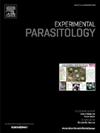Impact of combination chemotherapy with praziquantel and gentamicin or doxycycline on acute hepatic and intestinal schistosomiasis in BALB/c mice
IF 1.6
4区 医学
Q3 PARASITOLOGY
引用次数: 0
Abstract
Background and aims
Marked divergences in the immunological mechanisms that regulate the pathophysiology of acute and chronic schistosomiasis have a direct influence on pathological outcomes and antiparasitic chemotherapy responses at different stages of Schistosoma mansoni infection. In that way, this study evaluated the impact of combination antiparasitic chemotherapy, involving gentamicin (GEN) and doxycycline (DOX) in combination with praziquantel (PZQ) on the development of acute hepatic and intestinal schistosomiasis in mice.
Methods
BALB/cmice were randomized into five experimental groups, and the formation of hepatic and intestinal granulomas was evaluated by histopathological and histomorphometric analyses, quantification of hepatic parasite load, and biochemical parameters (ALT, AST, ALP, and albumin).
Main findings
PZQ + DOX combination potentiated hepatic granulomatous inflammation, diffuse fibrosis and ALT circulating levels, indicating greater morphofunctional liver damage. AST levels were increased in PZQ + GEN-treated animals. This response corroborated the histopathological findings, indicating an accelerated modulation towards the chronic phase as manifested by reduced granuloma size compared to infected untreated animals.
Conclusion
PZQ combination with DOX and GEN induced differential modulation of the granulomatous inflammation, with DOX aggravating this process and GEN exerting protective effects by accelerating schistosomiasis resolution in S. mansoni-infected mice.

吡喹酮与庆大霉素或强力霉素联合化疗对BALB/c小鼠急性肝肠血吸虫病的影响。
背景与目的:调节急、慢性血吸虫病病理生理的免疫机制存在显著差异,直接影响曼氏血吸虫感染不同阶段的病理结局和抗寄生虫化疗反应。因此,本研究评估了庆大霉素(GEN)和强力霉素(DOX)联合吡喹酮(PZQ)抗寄生虫化疗对小鼠急性肝肠血吸虫病发展的影响。方法:将BALB/ c小鼠随机分为5个实验组,通过组织病理学和组织形态计量学分析、肝脏寄生虫负荷定量和生化指标(ALT、AST、ALP和白蛋白)评估肝脏和肠道肉芽肿的形成。主要发现:PZQ+DOX联合治疗可增强肝脏肉芽肿性炎症、弥漫性纤维化和ALT循环水平,提示肝形态功能损伤加重。PZQ+ gen处理动物AST水平升高。这一反应证实了组织病理学结果,表明与感染未治疗的动物相比,肉芽肿大小减小,加速了向慢性期的调节。结论:PZQ联合DOX和GEN可诱导肉芽肿性炎症的差异调节,其中DOX可加重该过程,而GEN可通过加速曼氏梭菌感染小鼠的血吸虫病消退发挥保护作用。
本文章由计算机程序翻译,如有差异,请以英文原文为准。
求助全文
约1分钟内获得全文
求助全文
来源期刊

Experimental parasitology
医学-寄生虫学
CiteScore
3.10
自引率
4.80%
发文量
160
审稿时长
3 months
期刊介绍:
Experimental Parasitology emphasizes modern approaches to parasitology, including molecular biology and immunology. The journal features original research papers on the physiological, metabolic, immunologic, biochemical, nutritional, and chemotherapeutic aspects of parasites and host-parasite relationships.
 求助内容:
求助内容: 应助结果提醒方式:
应助结果提醒方式:


